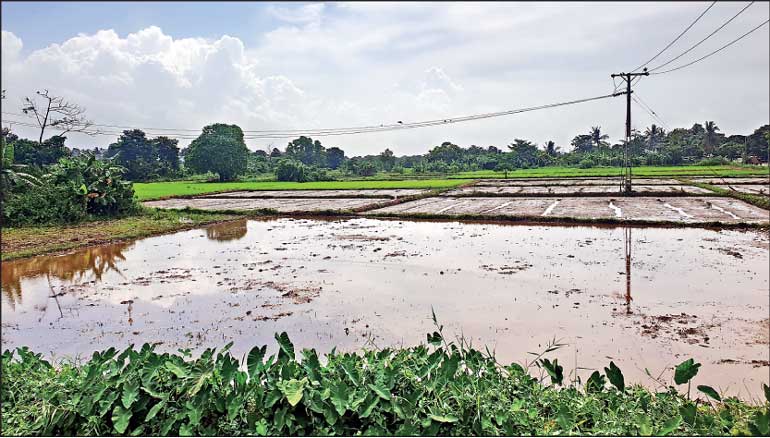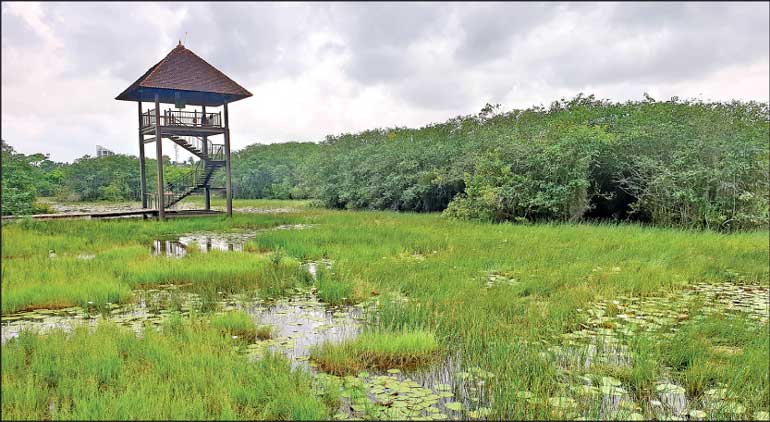Monday Feb 16, 2026
Monday Feb 16, 2026
Saturday, 23 October 2021 00:01 - - {{hitsCtrl.values.hits}}

Urban paddy cultivation in Colombo
 Colombo is a city of canals, lakes, and wetlands. Even after a period of growth and urbanisation over the last century, approximately 1,900 hectares of wetlands remain within Colombo’s administrative boundaries, more than 8% of the total city area.
Colombo is a city of canals, lakes, and wetlands. Even after a period of growth and urbanisation over the last century, approximately 1,900 hectares of wetlands remain within Colombo’s administrative boundaries, more than 8% of the total city area.
Collectively known as Colombo Wetland Complex or Colombo Flood Detention Area, these remnants of the original Kelani river estuary wetlands include contiguous areas such as Beddagama, Thalawatugoda, Kimmbulawela, Madiwela, Kolonnawa, Crow Island, Talangama Lake, or Beira Lake.
A wetland capital
Envisioning and acknowledging Colombo as a Wetland City is important for several reasons. First of all, the wetland complex provides a range of benefits to people and the environment, for example by regulating the city’s temperature, air, and water; reducing climate change impacts; providing food and medicinal ingredients through foraging, paddy and vegetable cultivation, livestock grazing, and fisheries; serving as “green lungs” to capture carbon emissions; and sheltering almost 280 species of animals as well as over 250 species of plants, including endemic and critically endangered ones.
Urban wetlands also have a crucial function when it comes to floods and storm surges, both of which are becoming more frequent and intense due to climate change. Wetlands can act as “sponges” and absorb flood water, slow down runoff, and lower flood peaks. The reduction of wetlands in Colombo is thought to have contributed to moderate to major flood incidents becoming more common in recent decades, with significant floods for example in 1985, 1989, 1990, 1992, 1994, 2002, 2004, 2005, 2006, 2007, 2008, 2010, and 2017.
Moreover, Colombo is the only South Asian city that has been accredited as a ‘Wetland City’ under the Ramsar Convention on Wetlands of International Importance. The Ramsar Convention is a global treaty with 172 parties working toward “the conservation and wise use of all wetlands through local and national actions and international cooperation,” protecting wetlands in over 2,300 Ramsar sites across the world. In October 2018, at the 13th Meeting of the Conference of the Parties to the Ramsar Convention, it named eighteen cities worldwide as “Wetland Cities” to encourage the sustainable use of urban wetlands and enhance urban wetland conservation.
Challenges and opportunities
Colombo’s wetland complex provides many benefits, but it is under constant pressure from population growth and development. Every year, the city loses around 1.2% of its wetland area to development activities, land filling, solid waste dumping, untreated domestic wastewater, invasive species, and algal blooms downstream from farms. Currently, only the Talangama Lake Environmental Protection Area and the Sri Jayewardenepura Kotte Wildlife Sanctuary are specifically declared as protected areas, but Sri Lanka’s policy and legal framework has provisions for general wetland protection as well.
By halting wetland destruction and reverting degradation, urban wetlands could be better integrated into city planning and function as resilient and cost-efficient assets. With increasing public awareness and understanding, usage patterns could shift to become more environment-friendly and focus on sustainable cultivation, reed harvesting, recreational activities, or ecotourism. Capitalising on its unique location, rich biodiversity, and global status as a Ramsar city, Colombo could become a model for urban wetland conservation and benefit from the many ecosystem services they offer.
Preserving and expanding Colombo’s wetlands is a long-term investment in sustainable and green urban infrastructure. Particularly in the face of climate change, wetlands provide nature-based solutions that can improve human wellbeing, mitigate climate impacts, and enhance livelihoods and food security of poor and vulnerable households. The designation of Colombo as a Ramsar Wetland City is a milestone achievement and an opportunity to enhance wetland protection through increased awareness and combined action from Government, private sector, and civil society.

Beddagama Wetland Park
(The writer works as Director – Research & Knowledge Management at SLYCAN Trust, a non-profit think tank based in Sri Lanka. His work focuses on climate change, adaptation, resilience, ecosystem conservation, just transition, human mobility, and a range of related issues. He holds a Master’s degree in Education from the University of Cologne, Germany and is a regular writer to several international and local media outlets.)